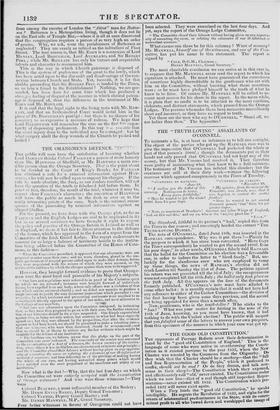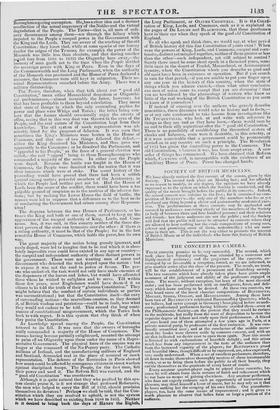" THE GOOD OLD CONSTITUTION."
THE opponents of Peerage Reform avow their determination to stand by the "good old Constitution of England." This is the language of some who were active in overthrowing the Consti- tution as it existed previous to the year 1832, when the New Charter was wrested by the Commons from the Oligarchy. Do they wish that the Charter should be a mockery—that the "full and free Representation of the People," which it professed to confer, should not be real ? Or do they dream, and talk non- sense in their sleep?—The Constitution which they expound, and affectionately call " old," never existed. The Constitution under which we now live—that of a real though still imperfect Repre- sentation—never existed till 1832. The Constitution which pre- ceded 1832 will never exist again. When a Tory lauds the " good old Constitution," he speaks intelligibly. He regrets the Revolution of 1832, and sighs for the return of aristocratical predominance in the State, with its conco- mitant profit to all who bowed down and worshipped the image of Boroughmongering corruption. Hei,hasaclear idea and a distinct recollection of the actual supremacy of the Nobles and the virtual degradation of the People. The Tories—that is, all men of ordi- nary discernment among them—see through the fallacy which imputed to the People a coequal power in the Government with the King and the Lords. They are aware of the working of the old Constitution : they know that, while at some epochs of our history (under the reigns of the TUDORS, for example) the power of the Mouarch was little less than absolute, and that during another pigiod (say from 1688 to 1832) the Oligarchy bore sway,—the memory of man goeth not to the time when the People divided the sovereign power with King or Peers. Even in the days of the Commonwealth and the Long Parliament, when the authority of the Monarch was prostrated and the House of Peers declared a nuisance, the Commons were still kept in subjection. Their no- minal Representatives crouched before the Army. There was a military dictatorship. The Tories, therefore, when they talk about our " good old Constitution," mean either Monarchical despotism or Oligarchi- cal predominance,—almost invariably the latter, however; for that has been profitable to them beyond calculation. They mean that state of things in which the only contending parties for power and place were Whigs and Tories ; the latter being con- tent that the former should occasionally enjoy the sweets of office, seeing that in this way dust was thrown in the eyes of the People, and the real nature of the Constitution kept from their knowledge. The old system of mock representation was ad- mirably fitted for the purposes of delusion. It was seen that sometimes the King's Ministers were beaten in the House of Commons, and that one of two things followed the defeat,— either the King dismissed his Ministers, and thus gave way apparently to the Commons ; or he dissolved the Parliament, and " appealed to his People," as the farce of a general election was called,—the real " appeal" being to those Boroughmongers who commanded a majority of the seats. In either case the People were duped. Because the battle was fought in the House of Comtnons, the People were deceived with the notion that it was their interests which were at stake. The secret history of the proceeding would have proved that there had been a selfish quarrel among certain powerful members of the Aristocracy, in which the People had neither part nor lot. Had the House of Lords been the scene of the conflict, there would have been a too palpable ground of suspicion as to the motives of the adverse fac- tions; but by making the Lower House the field of battle, the masses were led to suppose that a difference as to the best mode of conducting the Government had arisen among their Represen- tives!
The disputes between the two Houses of Parliament, or be- tween the King and both or one of them, served to keep up the appearance of the coequal authority of King, Lords, and Com- mons. See, it was said, in this country neither of the three dis- tinct powers of the state can tyrannize over the other : if there is a ruling authority, it must be that of the People; for in the last resort the House of Commons, which holds the purse, has its own way.
The great majority of the nation being grossly ignorant, and easily duped, were led to imagine that to be real which it is abso- lutely impossible ever could have existed in any age or country— the coequal and independent authority of three distinct powers in the government. There were not wanting men of sense and discernment who detected the trick played upon the nation : but to expose it was not the road to power or favour. The per- ten who undertook the task would not only have made enemies of the dispensers of the loaves and fishes, but would have affronted those whom he wished to enlighten and to serve. Till within these few years, most Englishmen would have deemed it an offence to be told the truth of their " glorious Constitution." They might believe that the conduct of certain individuals or parties was unconstitutional ; but that the Constitution itself—the envy of surrounding nations—the marvellous creation, as they deemed it, of British wisdom and patriotism—could be in fault, was what they would not endure to be told. This caused the long conti- nuance of constitutional misgovernment, which the Tories look back to with regret. It is this system that they think of when they praise the Constitution.
As knowledge spread among the People, the Constitution tottered to its fall. It was seen that the owners of boroughs really commanded a majority of the House of Commons. The masses having become partially enlightened, resented the attempt to palm off an Oligarchy upon them under the name of a Repre- sentative Government. The physical force of the empire was no longer at the command of the No-Popery party. The Catholic millions of Ireland, and the manufacturing millions of England and Scotland, deManded real in the place of nominal or mock representation. The defence of the Barricades in Paris showed how much could be effected by courageous citizens in street warfare against disciplined troops. The People, for the first time, felt their power and used it. The Reform Bill was carried, and the " good old Constitution" was overthrown.
Although it is quite natural that they who profited by this sys- tem should praise it, is it not strange that professed Reformers, the men who helped to carry the Bill of 1832, should proclaim themselves its devotees? Perhaps we shall be told, that the Con- stitution which they are resolved to uphold, is not the system
which we have described as existing from 1688 to 1832. Neither LS it desired to bring back the days of HENRY the Eighth,
Air
the Long Parliament, or OLIVER CROSWELL. It is tie Condi- tution of King, Lords, and Commons, such as it is explained in
the pages of Da LoLmE and BLACKsTONE, that these gentlemen have in'their eye when they speak of the good old Constitution of England.
To all who speak and think thus, we would say, at what period of British history did this fine Constitution of yours exist ? When were the powers of King, Lords, and Commons, coequal and coex- tensive, distinct yet mingled together, neither of them greater or less than the other—each independent, yet still subject to control ? Surely there must be some short epoch in a thousand years, some little oasis in the desert of Feudal, Monarchical, or Aristocratical tyranny, when the Constitution which you describe as good and old must have been in existence or operation. But if you search in vain for that period,—if you arc unable to put your finger upon any one year in the history of this country, when the state of things which you admire existed,—then what other conclusion can men of sense come to, except that you are dreaming, ? that you are bewildered by the phraseology of writers who knew as little of the real working of the British Constitution as you seem to know of it yourselves ?
If instead of conning over the authors who gravely describe nonentities, these dreamers would refer to history and to facts,— or at any rate condescend to take lessons from investigators like DE TOCQUEVILLE, who look at and write with reference to things as they are and as they have been,—there would soon be an end to their silly aspirations after the " good old Constitution:' There is no possibility of establishing the theoretical system of checks and balances, even were it desirable, in this country, or if it were conceivable that a government could be permanently carried on in any country on such a principle. The Revolution of 1832 has given the controlling power to the Commons. The old Constitution, rhatever it was, has been swept away. A new order of things has commenced. We have obtained that Reform which, CANNING said, is incompatible with the existence of an hereditary House of Peers. Power has changed hands.



























 Previous page
Previous page